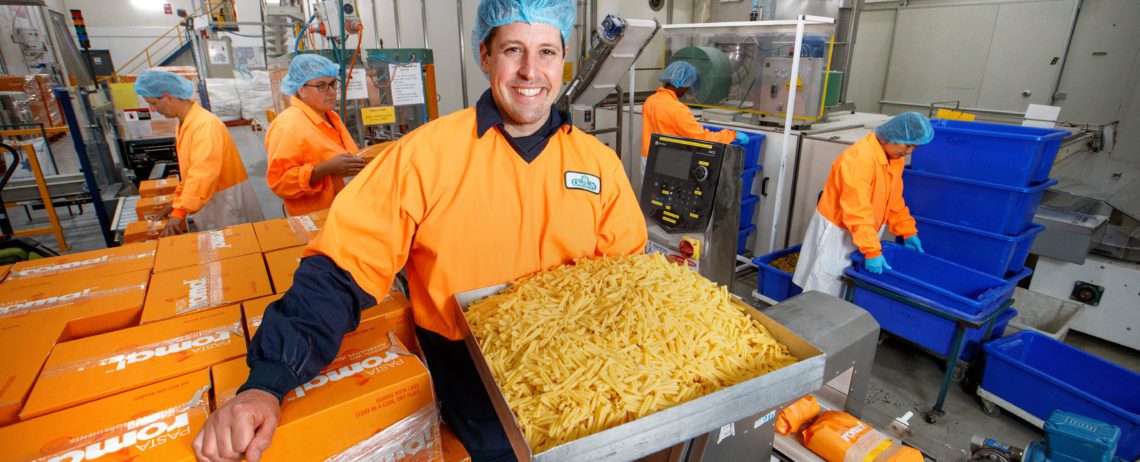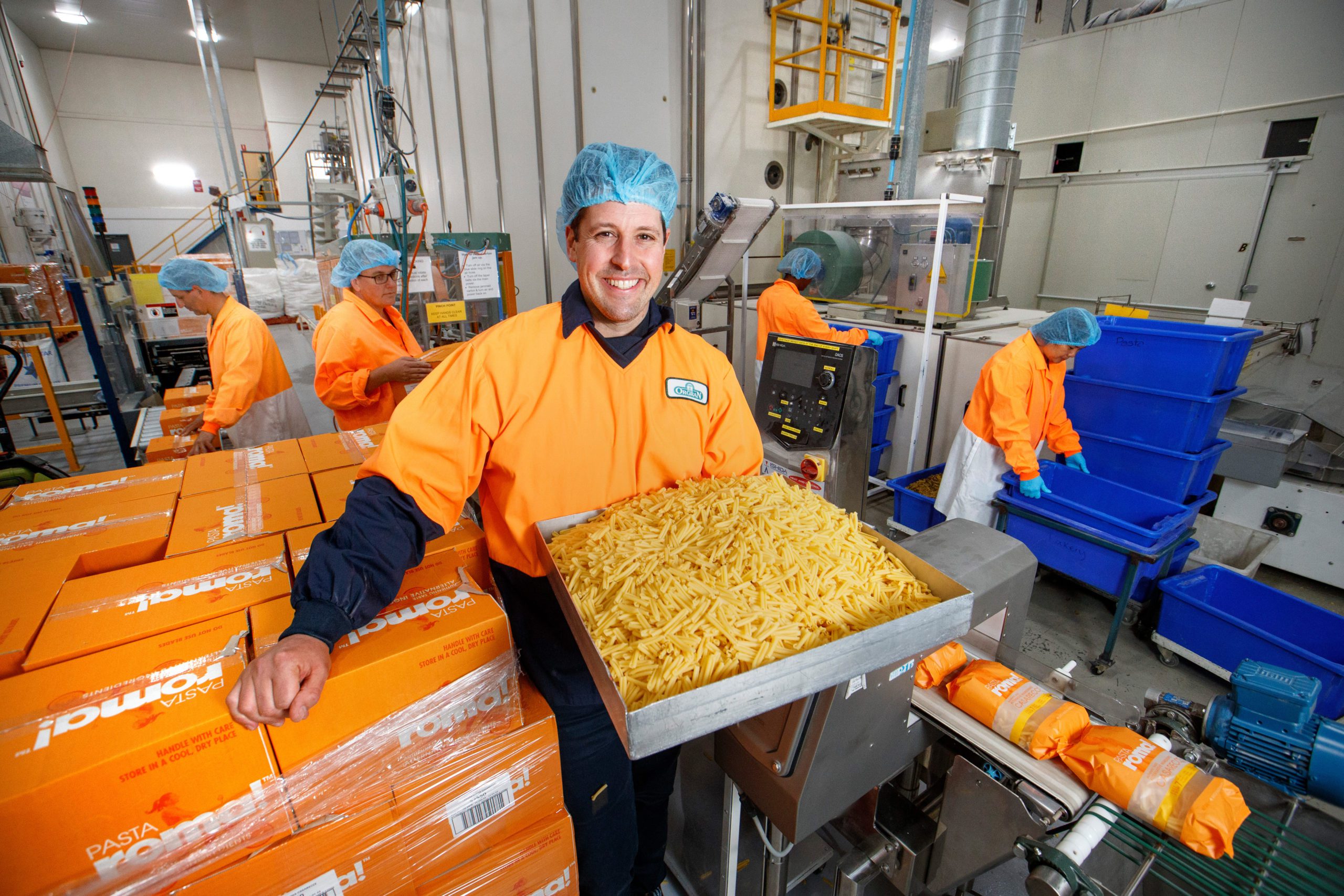Taking Stock: Reshaping the manufacturing industry post-pandemic
Ask The Experts | Industry Trends | By | 18 Mar 2022 | 5 minute read

Such has been the pace and breadth of change in the last few years that the world is awash with predictions about just what the post-pandemic ‘normal’ might look like. With no shortage of expert opinions, we decided to go straight to the source — industry leaders in the thick of it, handling every hurdle and putting in the hard yards.
We spoke to Sam Schachna, CEO of Roma Foods, to dig into pandemic lessons learned and how he’s rethinking the world of work. Here’s a look back—and a lens on what’s next.

Meet Sam Schachna, CEO of Roma Foods.
Operating for nearly 7 decades and exporting to over seventy countries worldwide, Roma Foods is an Australian, family-owned manufacturer on a mission to create great food for healthier living. As consumers increasingly demand locally-made, allergen-friendly and plant-based foods, Roma has taken their operations to another level. Here’s how they accelerated their growth amid the challenges of COVID-19.
What new processes did you create in COVID-19 that will continue long after the pandemic?
The Australian food manufacturing sector was well prepared leading into the pandemic due to the Good Manufacturing Practices that are embedded within the industry. Nevertheless, the pandemic posed many challenges for which there was no set playbook.
With ever-changing government regulations and market dynamics, COVID led to us adopting a new mindset of ‘measured urgency’, proving that we can do better, quicker, and more effectively. To achieve this, Roma defined a new business strategy to meet the needs of the ever-growing health shopper, launching over 25 new products into the health and mainstream aisles and adopting new technology improvements such as digitizing workflows to empower our journey of growth and innovation whilst ensuring our priority remains on safe people, safe product and safe data.
What does “living with COVID” look like for your industry?
COVID has sparked a renaissance in the local food manufacturing sector, and Roma Foods is fortunate to be riding this wave. Despite the upheaval caused by COVID-19, the pandemic has in fact accelerated opportunities for Australian food manufacturers like Roma Foods. The future is very bright for local companies with great teams, robust supply chains, a commitment to innovation, and established relationships with key customers.
What’s the top focus for your industry to tackle in order to be able to effectively “live with COVID”?
COVID has highlighted several priorities and accelerated several trends in the food manufacturing sector. Something that insulated Roma Foods against major COVID disruption was our existing focus on local, robust supply chains. The industry will face continued supply chain disruption from both COVID and global influences. It is therefore critical to purchase locally wherever possible and build strong relationships to enhance the overall resilience of the sector. Roma Foods is proud of its strong relationships with local suppliers based on years of collaboration, As an industry, we need to invest in the depth and capability of local supply chains – from farm to plate – to ensure that we are always in a position to provide food security to all in our community.
In a similar vein, there is a need to invest in local capability and infrastructure to improve efficiency and innovation. It is not an even playing field for local manufacturers, as Australia does not have the scale or local market size to compare to global multinationals. To thrive in the local industry, it is critical to compete where local is a competitive advantage and to invest in skills and infrastructure to improve efficiency and innovation.
What’s the biggest challenge your industry is facing right now?
COVID has highlighted various challenges in the local food manufacturing industry, including the need to address our skilled labour shortage. Whilst food and beverage is the largest manufacturing sector, employing one in four manufacturing workers in Australia, we continue to face significant labor shortages to respond to market demand. These challenges were exacerbated when workers had to isolate themselves due to having COVID or being a close contact. We need to look at opportunities to encourage the next generation to pursue a job in food manufacturing; and provide the necessary training and education to support the development of the sector. Roma have been working closely with our local community to increase the size of our workforce by over 30% in the last 12 months. We have also introduced various staff engagement initiatives, an Employee Assistance Program, and also training programs to fast track internal leadership development.
A second challenge is the price pressure already mentioned that comes with competing against multinationals who can keep their prices down due to scale or reduced labor costs. Whilst consumers are looking to “shop local”, price point continues to drive your average shopper. That is why it is important to invest in innovation to deliver value-added opportunities, together with technology and infrastructure to ensure the local industry remains competitive and scaleable. Product quality and ethical sourcing remain important competitive strengths.
What is the biggest industry opportunity you see for positive change in a post-pandemic world?
Whilst COVID has been an extreme global disruptor, it has exposed the vulnerability of imported food systems. This has reinforced the need to build local preparedness and continuity strategies as we continue to face supply chain instability due to events spanning from natural disasters to global political instability.
The biggest opportunity for positive change in the post-pandemic world is the renewed focus on locally-made products together with consumers’ desire toward living healthier lives.
The importance and advantage of Australian-made has never being more apparent. This has been acknowledged by the Government in recognising the food and beverage manufacturing sector as a key platform in the recently announced $1.5bn Modern Manufacturing Strategy. Consumers are voting with their wallets, with sentiment toward Australian-made products increasing through COVID, up 6% to 93%.
Our community are telling us they want to eat better and live healthier lives. The pandemic has indeed urged people globally to reconsider their dietary habits and shift towards healthier living, and plant-based meal delivery services have seen a rise in demand, interestingly, as one of the responsive initiatives. CSIRO have predicted that the health and sustainable market could be worth more than $25 billion to Aussie producers by 2030, which would make our sector more valuable than mining. This trend has supported Roma’s strategic pivot in our business strategy to align with our new mission of creating great food for healthier living.
With the learnings you’ve gained from the pandemic, what advice would you give people in your field?
The COVID crisis presented a unique opportunity to reinforce priorities and drive change. It has highlighted a number of priorities that continue to drive our approach:
- Invest in your people and local relationships. Roma’s response and ability to supply with limited interruption during the pandemic was made possible by our great team and great partners. Our team responded with agility, innovation, and creativity. While we will eventually return to some semblance of normality, the role that the local sector will play in the future is forever changed. In the vacuum left by the collapse of the international supply chain, consumers are flocking to Australian-made food, and our data shows they’re staying, despite many of the imported alternatives starting to trickle back in.
- Being alive to opportunity and taking calculated risks is key to survival. This is especially so in a time where there is so much uncertainty. Through COVID we scaled up to respond to increased demand in the short term and kept one eye on growth, launching new brands into new markets.
- Be proud of what you do. At Roma Foods, we see the provision of our gluten-free and plant-based foods as an essential service. Our community relies on us and it’s something we take very seriously.
- Always have one eye on growth. A key tenet of an expansion mindset is investing in human and capital infrastructure. Our vision is to have a Roma Foods product in every family’s pantry. By investing in our people, brands and capability, we are getting closer to achieving our vision everyday.
Important Notice
The information contained in this article is general in nature and you should consider whether the information is appropriate to your specific needs. Legal and other matters referred to in this article are based on our interpretation of laws existing at the time and should not be relied on in place of professional advice. We are not responsible for the content of any site owned by a third party that may be linked to this article. SafetyCulture disclaims all liability (except for any liability which by law cannot be excluded) for any error, inaccuracy, or omission from the information contained in this article, any site linked to this article, and any loss or damage suffered by any person directly or indirectly through relying on this information.





